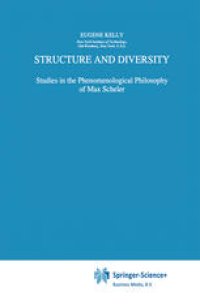
Ebook: Structure and Diversity: Studies in the Phenomenological Philosophy of Max Scheler
Author: Eugene Kelly (auth.)
- Tags: Phenomenology, Modern Philosophy, Philosophy of Man, Ethics
- Series: Phaenomenologica 141
- Year: 1997
- Publisher: Springer Netherlands
- Edition: 1
- Language: English
- pdf
FOUNDATIONALISM IN PHILOSOPHY n his autobiographical work, The Education of Henry Adams, this I brooding and disillusioned offspring of American presidents confronted, at age sixty, his own perplexity concerning the new scientific world-view that was emerging at the end of the century. He noted that the unity of things, long guaranteed morally by the teachings of Christianity and scientifically by the Newtonian world-view, was being challenged by a newer vision of things that found only incomprehensible multiplicity at the root of the world: What happened if one dropped the sounder into the ab yss-let it go-frankly gave up Unity altogether? What was Unity? Why was one to be forced to affirm it? Here every body flatly refused help. . . . [Adams] got out his Descartes again; dipped into his Hume and Berkeley; wrestled anew with his Kant; pondered solemnly over his Hegel and Scho penhauer and Hartmann; strayed gaily away with his Greeks-all merely to ask what Unity meant, and what happened when one denied it. Apparently one never denied it. Every philosopher, whether sane or insane, naturally af firmed it. I Adams, then approaching with heavy pessimism a new century, felt instinc tively that, were one to attack the notion of unity, the entire edifice of human knowledge would quickly collapse. For understanding requires the unification of apparently different phenomena.
This book explores some foundational concepts of Scheler's phenomenological philosophy. Seldom or inadequately explored features of his thought, such as the concept of essence, the notion of fate and milieu as foundational of the human person, and the pedagogical and historical implications of his vision of a balancing-out of world cultures, are each related to the phenomenological procedures that Scheler adapted from E. Husserl. This is the first contribution to the specifically phenomenological aspects of Scheler's philosophy since E.W. Ranly's Scheler's Phenomenology of Community, published in 1966, and the only one to develop a global reading of Scheler's thought based upon the manuscripts by Scheler that have been published since 1973.